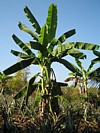|
banana plant
A
non-woody
fruitbearing
plant,
with a soft herbaceous stem, that is made up of leaves that wrap round each
other, forming what appears to be a trunk, which
often leads
to
this plant
mistakenly
being referred to as a tree.
The outer layers can be pealed from the stem which is frequently
used as pig food by local farmers (fig.), as well as for making
krathong
(fig.).
The plant grows up to several meters high and in
Thailand there are many different kinds, either edible or inedible,
and growing both in the wild and on farms.
Chatuchak
Park (fig.)
in
Bangkok
has an educative Banana Garden (fig.),
which displays a large variety of different species of banana plant.
The largest collection of banana
plants, however, is not found in the tropics or subtropics, but at
the Laboratory of Tropical Crop Improvement, an academic research
centre in support of the enhancement of tropical crops, with special
emphasis on
bananas and plantains (fig.)
attached to the Faculty of Bioscience Engineering of the Catholic
University of Leuven, in Belgium.
The banana plant has typical large, flat
leaves.
The
stalk grows upward through the apparent trunk
and emerges from the top in the form of an
arched
overhanging
inflorescence,
on which the
fruits grow. The fruits grow
in bunches, each having several
combs (fig.)
and each comb has around a dozen bananas.
They grow towards the light, making them curve and resulting in
their typical shape.
A slice of the banana plant's
inflorescence
or
flower-bud (fig.),
called
hua
plih in Thai (fig.), is often served with
phad thai.
From the stem or kahn (ก้าน) of the banana plant an imaginative
horse is made in the traditional children's game
mah kahn kluay (fig.).
In religious mythology, the
arahat
Vanavasin
was born and is believed to have gained
Enlightenment
under a
banana plant, and hence is in art usually
depicted
seated on
a banana
leaf (fig.),
which in Thai is called
bai tong.
In
Myanmar,
people who die unmarried are buried with a banana trunk in their
coffin, so they would not remain alone in the afterlife. In Thai
known as
ton gluay.
See also
PANORAMA PICTURE.
回






|

